Registered nurses from across the country went to Washington DC last week to urge Congress to take action to fix the nation’s broken health care system by enacting Medicare for All.
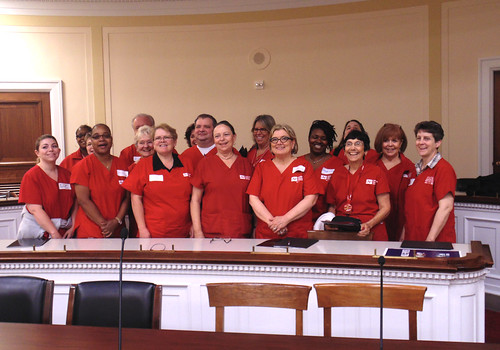
RNs from California, Florida, Illinois, Kansas, Maine, Maryland, Massachusetts, Michigan, Minnesota, Texas and Washington DC urged Congress to enact Medicare for All.
While our nation’s health care system has incredibly capable nurses and other health professionals, and boasts a variety of other advantages like the highest spending per person in the world, we don’t get the outcomes we should. Far too many go without health care when they need it. Our nation ranks behind 19 industrialized countries in preventable deaths among those under age 75.
In our for-profit health care system, too often patients’ needs seem to take a back seat to corporations’ efforts to build their bottom line. 42,000 Americans will die this year for lack of health coverage, or about 1 per 1,000 uninsured people. Nurses know all too well that patients face financial barriers to care – even with insurance. Over one-third of people report going without care or not filling a prescription due to cost, which is dangerous and can lead to unnecessary suffering, dramatically increased costs of care, and even death. Paul Holland, a nurse working at St. Louis University Hospital told staff for Senator Claire McCaskill (D-MO) about one patient who was forced to put off necessary treatment until she qualified for Medicare years later, which may well have led to her death.
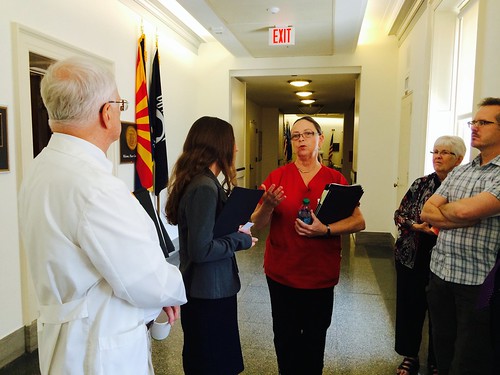
NNU Co-President Deborah Burger, RN, and other health care advocates made the case for Medicare for All to staff for Rep. Raul Grijalva (D-AZ).
These are among the reasons that National Nurses United advocates for Medicare for All. Nurses envision a more equitable world, where patients get the care they need without going broke. As part of the Nurses Campaign to Heal America, RNs went to Capitol Hill in Washington DC last Thursday to tell members of Congress that our patients need a system that puts them first.
Working with health care and consumer advocates, we visited dozens of Senators and Representatives of both political parties to tell them that the nation needs a change. Vikki Averegan and Sylvia Nell Searfross of Texas had a great conversation in the office of Rep. Beto O’Rourke (D-TX) that produced concrete suggestions from the congressman’s staff to help make that change possible – they suggested we continue our activism and speak up for better health care at town halls and by writing letters.
Under a single payer health care system, everyone can get the care they need while the nation saves nearly $600 billion per year by slashing overhead and negotiating lower drug costs with providers. Beyond financial savings, streamlining the payment system would free up substantial nurse time and other health care professional time that could be spent caring for patients.
Two thirds of Americans support a national health program that covers everyone, and nurses were proud to speak up for this important step toward a health care system that puts the needs of patients first.
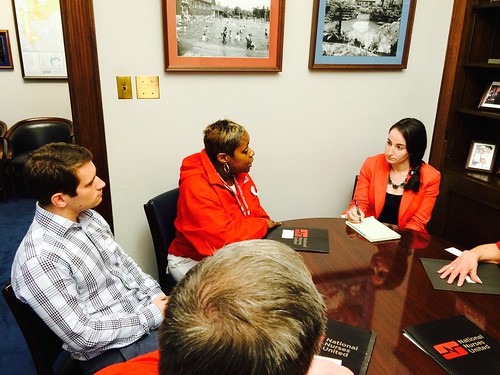
RN Kim Anderson of Chicago and a team of Illinois nurses urged staff for Rep. Mike Quigley (D-IL) to support Medicare for All.
Nurses also joined Sen. Bernie Sanders (I-VT) for a conversation about single-payer, improved Medicare for All at a summit with advocates Wednesday. We discussed how our health care system needs more than tinkering, that it needs an overhaul so that it enhances the clinical judgment of RNs and doctors and other caregivers in order to serves patients effectively. As patient advocates we can create a health care system offering universal access. We discussed how nurses and others reject a system where access is based on ability to pay, so are continuing our efforts to ensure that everyone gets the care they need.
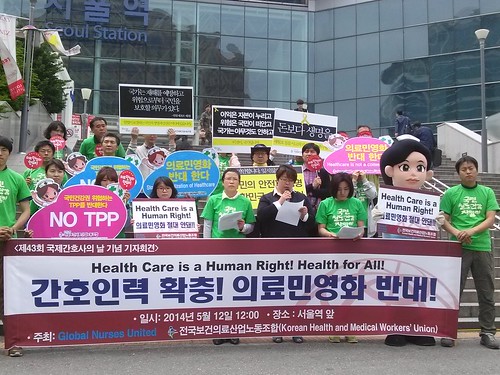
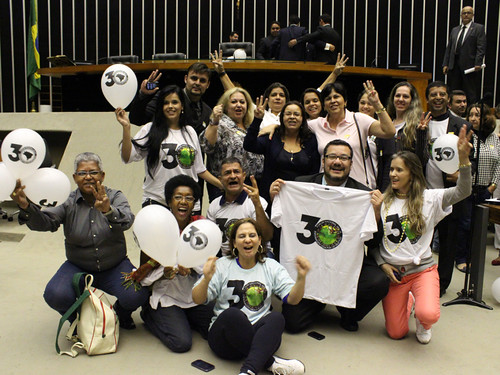
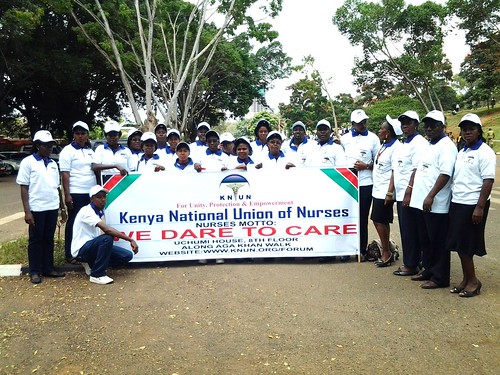
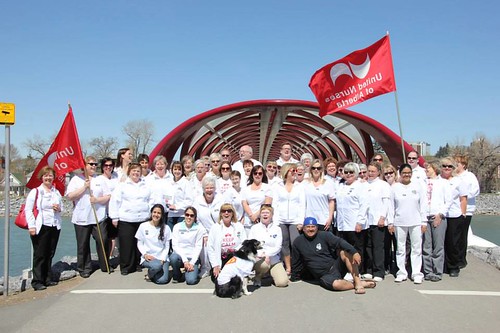
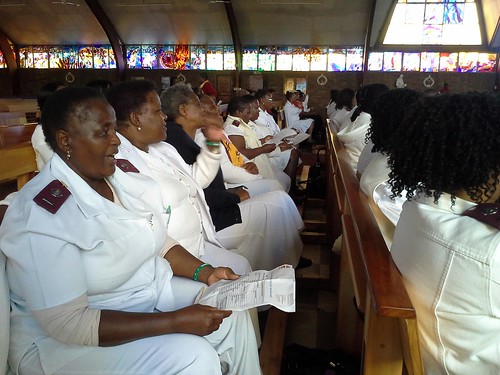
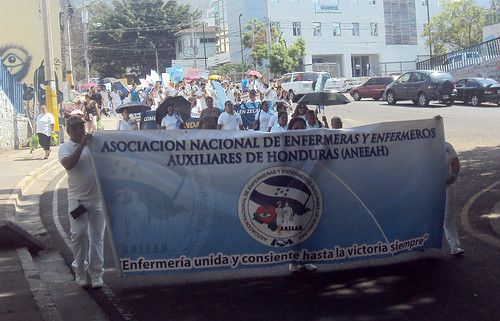
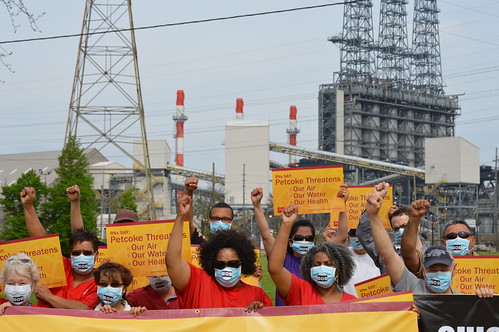
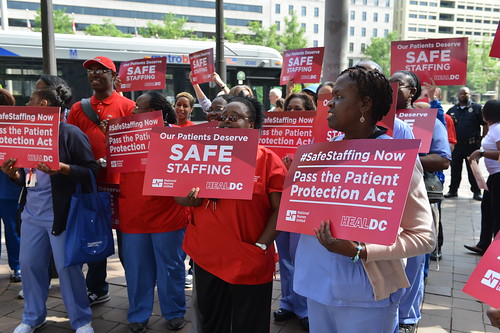
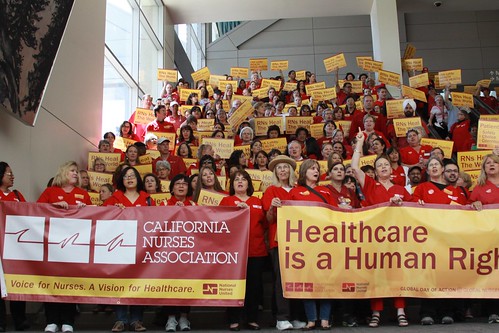


 Florence Nightingale (1820-1910) is credited as the founder of modern nursing, and despite this, public awareness is often limited to her work tending to the wounded in the Crimean war. In fact, she was an expert statistician and developed
Florence Nightingale (1820-1910) is credited as the founder of modern nursing, and despite this, public awareness is often limited to her work tending to the wounded in the Crimean war. In fact, she was an expert statistician and developed  Mary Seacole (1805-1881)
Mary Seacole (1805-1881)  Nazaria Lagos (1851-1945) was appointed as the first president of the Red Cross in Dueñas, Iloilo, in 1897, under the auspices of the Catholic Church and the military government, both aspects of Spanish colonial rule in the Philippines. Soon after, she and her family joined the Philippine movement for independence from Spain and Lagos organized a rebel hospital on her family’s remote hacienda.
Nazaria Lagos (1851-1945) was appointed as the first president of the Red Cross in Dueñas, Iloilo, in 1897, under the auspices of the Catholic Church and the military government, both aspects of Spanish colonial rule in the Philippines. Soon after, she and her family joined the Philippine movement for independence from Spain and Lagos organized a rebel hospital on her family’s remote hacienda.  Lavinia Dock (1858-1956) was a pioneer in nursing education and a political activist in the suffragist and other movements. In the 1907 American Journal of Nursing, Dock admonished her fellow nurses to get involved: “I am ardently convinced that our national association will fail of its highest opportunities and fall short of its best mission if it restricts itself to the narrow path of purely professional questions and withholds its interest and sympathy and its moral support from the great, urgent, throbbing, pressing social clams of our day and generation.” Dock walked her talk and was arrested and jailed numerous times for her activism. Despite subsequent gains in women’s rights, her questions to her peers are still relevant today: “As the modern nursing movement is emphatically an outcome of the general woman movement and as nurses are no longer a dull, uneducated class, but an intelligent army of workers…What is to be our attitude toward full citizenship? Shall we be an intelligent, enlightened body of citizens, or an inert mass of indifference?”
Lavinia Dock (1858-1956) was a pioneer in nursing education and a political activist in the suffragist and other movements. In the 1907 American Journal of Nursing, Dock admonished her fellow nurses to get involved: “I am ardently convinced that our national association will fail of its highest opportunities and fall short of its best mission if it restricts itself to the narrow path of purely professional questions and withholds its interest and sympathy and its moral support from the great, urgent, throbbing, pressing social clams of our day and generation.” Dock walked her talk and was arrested and jailed numerous times for her activism. Despite subsequent gains in women’s rights, her questions to her peers are still relevant today: “As the modern nursing movement is emphatically an outcome of the general woman movement and as nurses are no longer a dull, uneducated class, but an intelligent army of workers…What is to be our attitude toward full citizenship? Shall we be an intelligent, enlightened body of citizens, or an inert mass of indifference?” Lillian Wald (1867-1940) invented the practice of the “public health nurse” and the concept of public health policies in general. Wald opened the
Lillian Wald (1867-1940) invented the practice of the “public health nurse” and the concept of public health policies in general. Wald opened the  Cecilia Makiwane (1880-1919) was raised in what was known at the time as, the British Cape Colony. In 1903 Makiwane was one of the first black students to be admitted to the colonial nursing college and then became the
Cecilia Makiwane (1880-1919) was raised in what was known at the time as, the British Cape Colony. In 1903 Makiwane was one of the first black students to be admitted to the colonial nursing college and then became the